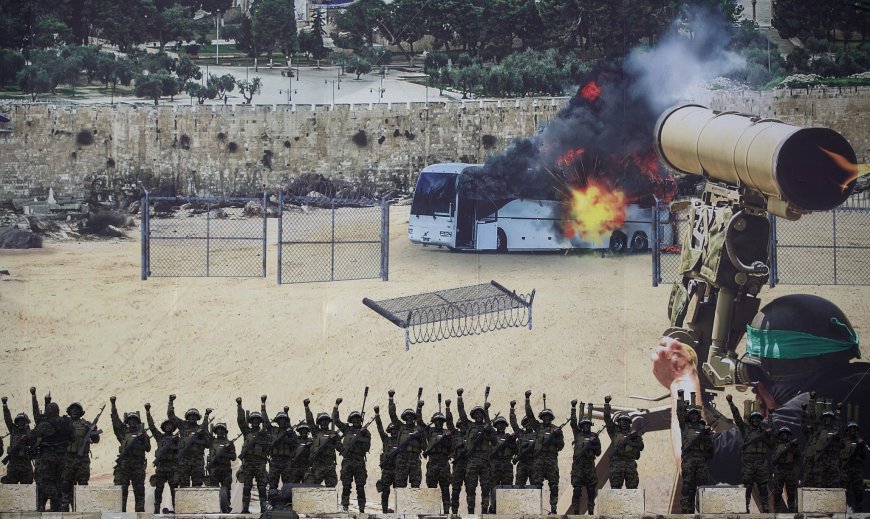Israeli troops battle Hamas in Gaza after Netanyahu rules out ceasefire

ISRAELI ground forces have attacked Hamas men and infrastructure in northern Gaza, after Prime Minister Benjamin Netanyahu categorically ruled out a ceasefire as a “surrender” to the Palestinian group.
“The soldiers killed fighters and directed air forces to real-time strikes on targets and terror infrastructure,” the army said, as tanks and other armoured vehicles advanced on Gaza City.
On the fourth night of ground operations in the north of the Palestinian territory, the army reported “several engagements” in which its forces came under anti-tank missile and machine gun fire.
Airstrikes hit about 300 targets including missile and rocket launch posts and “military compounds inside underground tunnels belonging to the Hamas terrorist organisation”, it added.
Jonathan Conricus, an Israeli military spokesperson, said ground operations were focused on northern Gaza, including Gaza City, which he said was the “centre of gravity of Hamas”.
He added: “But we also continue to strike in other parts of Gaza. We are hunting their commanders, we are attacking their infrastructure, and whenever there is an important target that is related to Hamas, we strike it.”
Hamas reported clashes with Israeli troops in the northwest and southern Gaza Strip. The al-Qassam Brigades, the armed wing of Hamas, said it fired anti-tank missiles at Israeli forces early on Tuesday, adding that troops were invading the southern Gaza axis. Hamas said it also targeted two Israeli tanks and bulldozers in northwest Gaza with missiles.
Israel has expanded ground operations in Gaza over recent days, advancing on Gaza City from two directions, with tanks reported to be on the main north-south road in an apparent effort to cut the strip into two.
Gaza health authorities say 8,306 people including 3,457 minors have been killed in Israeli attacks since Hamas launched raids into Israel on 7 October, killing more than 1,400 people and taking 240 hostages.
UN officials say more than 1.4 million of Gaza’s civilian population of about 2.3 million have been made homeless.
The rising death toll has drawn calls from the US, Israel’s top ally, for a pause in fighting to allow more humanitarian aid into Gaza.
On Monday, the US ambassador to the UN, Linda Thomas-Greenfield, urged the divided UN security council to come together, saying “the humanitarian crisis in Gaza is growing direr by the day”.
After the rejection of four previous resolutions in the 15-member Security Council – one vetoed by the US, one vetoed by Russia and China, and two for failing to get the minimum nine yes votes – last Friday Arab states went to the UN general assembly where there are no vetoes.
The 193-member world body adopted a resolution calling for humanitarian truces leading to a cessation of hostilities by a vote of 120-14 with 45 abstentions.
The Security Council has since been trying to negotiate a resolution that will not be rejected. While its resolutions are legally binding, assembly resolutions are not, though they are an important measure of world opinion.
In a sign of increasing US concern at the escalating Palestinian death toll, Thomas-Greenfield told the council that Biden had reiterated to Netanyahu, “that while Israel has the right and responsibility to defend its citizens from terrorism, it must do so in a manner consistent with international humanitarian law”.
Netanyahu said on Monday that Israel would not agree to a cessation of hostilities in Gaza and would press ahead with its plans to wipe out Hamas, declaring “This is a time for war”.
He said in televised remarks: “Calls for a ceasefire are calls for Israel to surrender to Hamas, to surrender to terrorism, to surrender to barbarism. That will not happen.”
Netanyahu said the army’s advance through Gaza opened opportunities to free hostages, which Hamas would do only under pressure.
Military specialists said Israeli forces were moving slowly in their ground offensive in part to keep open the possibility that Hamas militants would negotiate the release of the hostages.
The head of the UN agency for Palestinian refugees told a UN emergency meeting on Monday that “an immediate humanitarian ceasefire has become a matter of life and death for millions”, accusing Israel of “collective punishment” of Palestinians and the forced displacement of civilians.
Philippe Lazzarini said a further breakdown of civil order after the looting of the agency’s warehouses by Palestinians searching for food and other aid would make it extremely difficult, if not impossible, for the largest UN agency in Gaza to continue operating.
